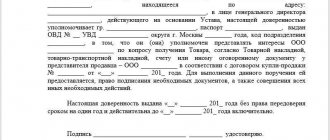How the powers of a legal representative of a legal entity are confirmed under the Civil Code of the Russian Federation
Who is the legal representative of a legal entity? This question may arise when reading Art. 27 of the Tax Code and Art. 25.4 of the Code of Administrative Offences. The legal representative of a legal entity is unknown to the Civil Code. In Art. 53 Civil Code states:
- powers may be granted to one or more persons, acting jointly or separately, in accordance with the constituent documents;
- information about them must be indicated in the Unified State Register of Legal Entities (USRLE).
Note! Information is entered into the Unified State Register of Legal Entities according to an application using one of the forms, approved. by order of the Federal Tax Service of the Russian Federation “On approval of forms...” dated August 31, 2020 No. ED-7-14 / [email protected] (for example, when establishing an application under form P11001, information about a person acting without a power of attorney is entered on sheet E).
In the letter “On the obligation to submit an application...” dated June 16, 2017 No. GD-4-14 / [email protected] the Federal Tax Service of the Russian Federation indicates that an external or bankruptcy trustee is also a person who acts on behalf of a legal entity without a power of attorney, and within 3 days within the period after his appointment by the arbitration court, information about him must be entered into the Unified State Register of Legal Entities.
Thus, the main confirmation of the status of a legal representative of a legal entity is an entry in the Unified State Register of Legal Entities made on the basis of the constituent documents and the document of appointment (protocol or decision). In addition to this, a management agreement (an extract from it) may be submitted if management is entrusted to the manager.
The most difficult to apply interpretation of the concept of “legal representative” is contained in the Code of Administrative Offenses of the Russian Federation.
For information about who can represent the interests of an organization in an arbitration court, read the ready-made solution of ConsultantPlus. If you do not yet have access to the ConsultantPlus system, you can register for free for 2 days.
Position of the Constitutional Court of the Russian Federation
As a result, the contested norms of these articles of the Arbitration Procedure Code of the Russian Federation were recognized by the Constitutional Court as not contradicting the Constitution of the Russian Federation, since they do not limit the right of an organization to entrust the conduct of a case on behalf of this organization in the arbitration process to a person associated with it. In particular, its founder (participant) or employee who does not have a higher legal education or an academic degree in a legal specialty, but who, in the opinion of the represented organization, has the necessary knowledge and competence in the field of relations, the dispute of which is subject to resolution by an arbitration court.
Mandatory condition: the interests of this organization in the relevant case in the arbitration court simultaneously represented by:
- lawyers;
- or other persons providing legal assistance who have a higher legal education or an academic degree in a legal specialty.
Also, do not forget, in Art. 60 of the Arbitration Procedure Code of the Russian Federation directly lists persons who, in principle, cannot be representatives in legal proceedings.
Thus, the applicants in the case considered were faced with an unjustified and disproportionate restriction of the right of access to court. And that means legal protection.
Application of the term “legal representative of a legal entity”
Legal provisions that contain the term “legal representative” are reflected in the table.
| Art. 25.4 Code of Administrative Offenses of the Russian Federation | Art. 27 Tax Code of the Russian Federation |
| The protection of the interests of a legal entity can be carried out by legal representatives - the head, other persons recognized by the law and constituent documents of the legal entity. The legal representative confirms his authority with documents certifying his official position | Legal representatives - persons authorized to represent the specified organization on the basis of the law or its constituent documents |
As we can see, the legislator uses a variety of formulations and concepts (for example, the Tax Code of the Russian Federation does not require that the legal representative be a body of a legal entity). In the scientific literature there are the following objections to the use of the expression “legal representative”:
- The exercise of powers by a manager or other person acting without a power of attorney is not representation, but the direct exercise of the legal capacity of a legal entity, and therefore the use of the term “legal representative” is legally incorrect.
- There is a generally accepted terminology for designating the bodies of a legal entity, which is enshrined in industry (civil and labor) legislation: sole executive body, director (Article 273 of the Labor Code). And there is no need to duplicate it. In Art. 53 of the Civil Code of the Russian Federation provides the designation “a person acting without a power of attorney on behalf of a legal entity”, the list of such persons is fixed in the Unified State Register of Legal Entities, and there is no need to rename them as legal representatives.
Rights and obligations
The rights and obligations of a legal entity (employer) are exercised by authorized bodies and in the manner established by the Labor Code of the Russian Federation, laws, legal and regulatory acts and other constituent documents.
The rights of representatives include:
- complete protection from improper work and inappropriate labor relations on the part of the boss;
- taking certain measures to eliminate violations that have arisen;
- the possibility of terminating the employment contract in case of violations and deception of the boss;
- make decisions independently in collective bargaining.
The duties of representatives are equal to the above powers. They depend on labor relations and agreements and are mandatory if an employment contract is concluded.
In addition to the generally accepted rights and responsibilities, there are also those that will be discussed between the boss and the subordinate before starting work in the organization. They must be specified in the employment contract.
Who is the legal representative under the Administrative Code - the management company or its director?
The possibility of transferring management of an organization to another legal entity or individual entrepreneur (IP) is provided:
- clause 1 art. 42 of the Law “On Limited Liability Companies” dated 02/08/1998 No. 14-FZ;
- clause 1 art. 69 of the Law “On Joint Stock Companies” dated December 26, 1995 No. 208-FZ.
Important! When establishing a legal entity, information about the management company is entered into Sheet E f. P11001. The management company’s data is not included in the application - the new form P11001 does not provide space for this.
Since information about the head of the management organization is in the Unified State Register of Legal Entities, in practice he represents the interests of the managed entity without a power of attorney. Since the legal representative is an individual, the director of the management company is the legal representative of two organizations: the manager and the managed (see also the decision of the Moscow City Court dated April 10, 2018 in case No. 7-4128/2018).
Common situation in practice
In Resolution No. 37-P dated July 16, 2020, the Constitutional Court checked for compliance with the Constitution of Part 3 of Art. 59, part 4 art. 61 and part 4 of Art. 63 of the Arbitration Procedure Code of the Russian Federation in connection with the complaint of Alexandra LLC and citizen K.V. Budarina.
The point is that the specified individual is one of the founders of this company and its executive director. But the arbitration court did not allow him to participate in the court hearing as a representative of the LLC in a tax dispute, since he was not a person exercising the functions of the sole executive body. This means that he does not have the authority to represent by virtue of his status. In addition, Budarin did not confirm the presence of a higher legal education or an academic degree in a legal specialty.
According to LLC and Budarin, these norms of the Arbitration Procedure Code of the Russian Federation contradict the Constitution, since they do not allow a participant (founder) of a limited liability company, who is its executive director, who is deeply aware of the specifics of his business activities and has previously successfully acted as a representative in disputes involving the LLC, to represent his interests in the arbitration court by proxy in the absence of legal education.
Can a branch director be a legal representative of a legal entity under the Code of Administrative Offences?
A legal entity has the right to create branches and representative offices, including in other regions (Article 55 of the Civil Code of the Russian Federation). These divisions are entered into the Unified State Register of Legal Entities, and their heads act on the basis of a power of attorney. In this case, branches may be geographically distant from the parent organization. Based on Art. 25.4 of the Code of Administrative Offenses of the Russian Federation, the legal representative is the body of the legal entity.
Many norms of the Code of Administrative Offenses of the Russian Federation contain a requirement for direct actions of a legal representative:
- sign the inspection protocol (Article 27.8 of the Code of Administrative Offenses of the Russian Federation);
- exercise the right to familiarize yourself with the protocol on an administrative offense (clause 4 of article 28.2 of the Code of Administrative Offenses of the Russian Federation), etc.
In judicial practice, there are different approaches when considering cases of violations of branches. Thus, in the ruling of the Supreme Arbitration Court of the Russian Federation dated January 18, 2008 No. 7617/08, the position of the Federal Antimonopoly Service of the North Caucasus Region in case No. A-32-11471/2007-23/274-57АJ was supported: the director of the branch cannot be a legal representative, the initiation of the case should have been notified namely the head of the organization. Confirmation of the notification would be the issuance of a power of attorney for representation in a specific case.
Note! In paragraph 24 of the Resolution of the Plenum of the Supreme Arbitration Court of the Russian Federation “On some issues...” dated 06/02/2004 No. 10 (hereinafter referred to as Resolution No. 10), emphasis is placed on the fact that the list of legal representatives is closed and the director of the branch does not apply to them.
At the same time, the acting director of the organization is fully considered a legal representative (see the resolution of the Federal Antimonopoly Service of the Moscow Region dated February 6, 2013 in case No. A40-52047/12-93-522).
Types of representation
Employer representations can be divided into levels:
- level of organization (one employer delegates rights and responsibilities to his subordinate, heads the interests of the organization);
- higher levels (an association of two or more employers (trade unions or trade union organizations) with one common goal, representing the interests of each other in negotiations, making important decisions on labor issues).
There are also representative offices:
- legal (headed by law or established on the basis of acts of local governments or state bodies);
- voluntary (based on an agreement between the employer and his representative. These include commercial enterprises and powers of attorney).
When can an authorized representative be admitted under the Code of Administrative Offences?
Supreme Arbitration Court of the Russian Federation in paragraphs. 24, 24.1 of Resolution No. 10 gave an interpretation of the rules on proceedings under the Code of Administrative Offenses of the Russian Federation, from which the following conclusions can be drawn:
- in a case of an administrative offense, the determining factor for the observance of the rights of a legal entity is the notification of the initiation of the case, as well as an explanation of rights and obligations; it should be ensured that the legal representative is informed (Article 25.15, paragraph 3 of Article 28.2 of the Code of Administrative Offenses of the Russian Federation);
- further exercise of rights depends on the management of the legal entity, which can send a representative or defender to participate at all stages of the procedure (in accordance with Article 25.5 of the Code of Administrative Offenses of the Russian Federation).
At the same time, the power of attorney issued to the representative must list specific powers in the case of an administrative offense; a general power of attorney in this case may be rejected (see the resolution of the Supreme Court of the Russian Federation dated September 1, 2017 in case No. 18-AD17-22). This also applies to an abstract judicial power of attorney, which is not accepted during judicial appeals of decisions in cases of administrative offenses (see decision of the Supreme Court of the Russian Federation dated 06/07/2018 No. 47-AAD18-9).
In accordance with the conclusions of the Armed Forces of the Russian Federation, set out in the above judicial acts, if the power of attorney indicates the powers of representation in this particular case, such a document confirms that the legal representative has been properly notified and has expressed his will for the representative to participate in this case by power of attorney.
Representative powers
Since employer representatives are subjects of labor law, they can participate in legal relations and bear full responsibility for the actions performed. All powers are transferred by contacting the relevant trade union bodies with an application to represent the employee’s labor interests.
Powers may include:
- conducting collective negotiations, resolving disputes and making final decisions;
- participation in the management of the organization;
- conclusion or adjustment of employment contracts;
- the right to participate in the adoption of regulations.
Often, powers are established based on the employee’s job functions, and have the right to be regulated not only by the boss, but also by the subordinate. A number of functions, including professions, staffing, certain qualifications and abilities, have all the rights to organize the work process and are considered valid only if there is an employment contract with the employee.
The powers of the representative must be approved by a decision of an authorized body represented by a lawyer, or formalized by a power of attorney from the employer.
Also, any constituent documents of the organization, orders and regulations on the distribution of responsibilities in the company, local regulations of the organization can confirm the powers of the representative if they indicate all the powers of the employee.
So, after all, is the leader a representative?!
Some time ago, the topic was raised in connection with amendments made to the Civil Code of the Russian Federation. Paragraph 1 of Article 53 of the Civil Code of the Russian Federation for a short time began to sound as follows: “1. A legal entity acquires civil rights and assumes civil responsibilities through its bodies acting on its behalf (clause 1 of Article 182)...", and Article 182, as you know, is an article on representation in general.
Thus, this norm extended the provisions of the Civil Code on representation to the bodies of a legal entity, and heated debates broke out on the topic of whether the head of the legal entity is its representative.
The debate somehow faded away after “justice was restored” - the words “on his behalf (clause 1 of Article 182)” were removed from Article 53. According to colleagues, this should have meant that the legal entity’s body was not its representative.
For me, there has never been any ambiguity in this matter: the body of the legal entity “in general” (no matter what, no matter in what capacity) is, of course, not its representative, but the head of the legal entity acting in civil circulation, of course, is. Just as there has never been any ambiguity in this for the notary as a whole - all my life since the times of the USSR in certification inscriptions about directors and so on. managers wrote “the powers of the representative have been verified”, their powers were checked on the basis of the relevant articles, etc.
In the end, open the Civil Code of the Russian Federation for the concept of representation, or any textbook. From Art. 182 of the Civil Code of the Russian Federation obviously follows that representation is an action on someone else’s behalf and in someone else’s interests on the basis of an authority granted either by law, or by a power of attorney, or by another act (rare cases).
When the general director of Charmapukla LLC Petrov signs an agreement with Ivanov for the sale of a car, isn’t Petrov acting on behalf of Charmapukla LLC? On whose behalf is he acting then - his own, or what? It's not even funny. Or maybe, according to someone, Petrov does not act at all, but an LLC acts? Original, but unfortunately, also not according to the Civil Code - after all, through their actions, the rights and obligations for a legal entity are created by its bodies. And the fact that they are not directly called representatives does not change the essence of the matter at all.
Or does the director suddenly act not in the interests of this LLC? Definitely in the best interests. If he acted in other interests, then this would already be a violation.
Of course, the restorers of historical justice did exactly the right thing in Article 53 of the Civil Code: they really wrote the nonsense that all bodies, indiscriminately, which body and in what situation, are representatives of legal entities. Of course, the audit committee will never be representative. The board of directors (supervisory board) of the JSC will not be a representative. The general meeting of notaries will not be represented by the chamber of notaries. And so on.
A representative can only be a body endowed by the charter on the basis of law with the right to act on behalf of the legal entity in front of THIRD PARTIES WITHOUT A POWER OF ATTORNEY.
And it’s quite stupid to doubt its representative characteristics and properties. But - only in front of third parties. In the internal affairs of the company, when convening a meeting, when dismissing an employee, when announcing a penalty or gratitude, approving a staffing table, etc., the same general director of Charmapukla LLC will not be any “representative”. It will simply be an organ performing a specific function.
It seems to me that all the hysteria regarding whether a manager should be considered a representative was initially associated with a significant number of contracts in circulation, where the manager entered into an agreement with himself (usually as an individual, less often as with the head of another legal entity or a representative by proxy). Common sense told lawyers and courts that if everyone agrees with the validity of this agreement, then it would be stupid to cancel it under paragraph 3 of Article 182 of the Civil Code of the Russian Federation. But the old version of Article 182 of the Civil Code clearly insisted on the inadmissibility of such contracts - IF the manager is considered a representative. And then a certain AC, let’s not strain ourselves and look for which one, came up with an interesting version of the interpretation of the law, fortunately among theorists on this score, the spears have been broken for decades - that the leader is not a representative. This means that, subject to standard norms of legislation on interest in completing a transaction, you can enter into agreements either with yourself or on both sides from two legal entities.
In fact, this is, of course, sad. There is a civilized way to solve this problem, known, for example, to German law - where the trade register must give special permission to the head of the legal entity to enter into transactions with himself or as a representative of a third party. And it seems that in Article 182 of the Civil Code of the Russian Federation in the new edition they tried to build something similar... and again it was a failure.
Yes, the current version of clause 3 of Art. 182 of the Civil Code of the Russian Federation tried to provide a solution. Now it has this second paragraph:
“A transaction that was made in violation of the rules established in paragraph one of this paragraph, and to which the principal did not give consent, may be declared invalid by the court at the request of the principal if it violates his interests. Violation of the interests of the represented person is assumed unless proven otherwise.”
But unfortunately, the first paragraph was not corrected. As before, “A representative cannot make transactions on behalf of the person represented in relation to himself personally, as well as in relation to another person whose representative he is at the same time, except in cases provided for by law,” and the law does not provide such an opportunity. The second paragraph only talks about judicial appeal, but does not cancel the direct ban. Yes, you can’t appeal if you have the consent of the person being represented, but you also can’t make a complaint. It is clear that there were many who immediately wanted to justify what was possible, but this could only be justified with a very free interpretation.
But it would seem that after the words “except” it would be worth adding about the consent of the person being represented...
Now, of course, it is completely unclear whether paragraph 3 of Article 182 of the Civil Code of the Russian Federation still applies to transactions of managers of legal entities or not? And until there is a normal edition of it, I suspect that this ambiguity will only get worse.
Commentary on Article 27 of the Tax Code of the Russian Federation
Legal representatives of a taxpayer organization are persons authorized to represent the specified organization on the basis of the law or its constituent documents.
They may be:
— Sole executive body of a legal entity (CEO, president, chairman, etc.). He acts on behalf of the organization without a power of attorney, including representing its interests and making transactions; issues powers of attorney for the right of representation on behalf of the organization, including powers of attorney with the right of substitution; exercises other powers not assigned by the Federal Law or the constituent documents of the organization to the competence of the General Meeting of Participants of such a legal entity.
Documents confirming the powers of the sole executive body may be a protocol or decision, order, etc.
— Sole managers or management organizations.
So, in accordance with Art. 42 of the Federal Law of February 8, 1998 N 14-FZ “On Limited Liability Companies”, an LLC has the right to transfer under an agreement the powers of its sole executive body to the manager, if such a possibility is expressly provided for by the company’s charter. In this case, the agreement with the manager is signed on behalf of the company by the person who chaired the general meeting of the company's participants, who approved the terms of the agreement with the manager, or by the company participant authorized by the decision of the general meeting of the company's participants.
The powers of the legal representatives of an organization are most often confirmed by its constituent documents (charter, constituent agreement, as well as a decision (or protocol) on election to a position, order, etc.) or by law. For example, Art. 100 of the Tax Code of the Russian Federation gives the head of the inspected organization the authority to sign a tax audit report. Article 72 of the Civil Code of the Russian Federation establishes that each participant in a general partnership has the right to act on behalf of the partnership, unless the constituent agreement establishes that all its participants conduct business jointly, or the conduct of business is entrusted to individual participants, etc.
Legal representatives of a taxpayer - an individual - are persons acting as his representatives in accordance with the civil legislation of the Russian Federation.
a) organizations.
Legal representatives of an individual taxpayer can be organizations (medical institutions, social protection institutions, educational institutions, etc.).
In accordance with paragraph 4 of Art. 35 of the Civil Code of the Russian Federation, the guardians and trustees of citizens in need of guardianship or trusteeship and who are or are placed in appropriate educational, medical institutions, social welfare institutions or other similar institutions are these institutions.
In addition, Art. 147 of the Family Code of the Russian Federation establishes that guardians (trustees) are not appointed for children who are under full state care in educational institutions, medical institutions, social welfare institutions and other similar institutions. The implementation of their duties is entrusted to the administration of these institutions;
b) individuals.
- in accordance with Art. 61 of the Family Code of the Russian Federation, parents have equal rights and bear equal responsibilities in relation to their children (parental rights). Parental rights terminate when children reach the age of eighteen (the age of majority), as well as when minor children marry and in other cases established by law when children acquire full legal capacity before they reach adulthood (for example, emancipation).
In this case, documents confirming the authority of the legal representative will be a birth certificate and a passport.
- guardian or trustee of an individual.
Guardianship and trusteeship are established to protect the rights and interests of incapacitated or not fully capable citizens. Guardianship and trusteeship of minors are also established for the purpose of their education. The corresponding rights and obligations of guardians and trustees are determined by the legislation on marriage and family.
Guardians and trustees defend the rights and interests of their wards in relations with any persons, including in the courts, without special authority.
Guardianship and trusteeship of minors are established in the absence of parents or adoptive parents, deprivation of parental rights by a court, as well as in cases where such citizens for other reasons were left without parental care, in particular when parents evade their upbringing or protection of their rights and interests .
A guardian or trustee is appointed by the guardianship and trusteeship authority at the place of residence of the person in need of guardianship or trusteeship, within a month from the moment when these bodies became aware of the need to establish guardianship or trusteeship over the citizen. If there are circumstances worthy of attention, a guardian or trustee may be appointed by the guardianship and trusteeship authority at the place of residence of the guardian (trustee). If a person in need of guardianship or trusteeship is not appointed a guardian or trustee within a month, the performance of the duties of a guardian or trustee is temporarily assigned to the guardianship and trusteeship body.
Representative of the victim - legal entity
Lawyer Antonov A.P.
Part 9 art. 42 of the Code of Criminal Procedure of the Russian Federation states: “... if a legal entity is recognized as a victim, its rights are exercised by a representative.” We have already explained most of the terms used by the legislator here. Let us only draw the attention of the law enforcement officer to the fact that before the representative of the victim referred to in the specified legal provision acquires the rights of the victim, the legal entity he represents must itself be recognized as a victim, then the administration of this legal entity must provide the person with a document confirming his authority to represent the interests of the organization (enterprise, institution) in criminal proceedings.
In Part 9 of Art. 42 of the Code of Criminal Procedure of the Russian Federation is about the exercise of “his rights”. It is recommended to interpret the phrase “his rights” broadly. What are we talking about? That a representative of a legal entity recognized as a victim has all the rights of the victim (except for the right to have a representative, including a legal representative), and not only those rights of the victim that can be exercised by the legal entity.
Accordingly, the representative in question has the right to testify; moreover, to give the victim’s testimony in his native language or a language that he speaks; refuse to testify against yourself, your spouse and other close relatives, the circle of whom is defined in paragraph 4 of Art. 5 Code of Criminal Procedure of the Russian Federation; use the help of a translator for free, etc.
According to some proceduralists, the victim cannot independently (directly) exercise his rights if he is a legal entity. This statement is at least controversial. So it can get to the point where a legal entity is generally unable to exercise any of its rights, and not only in the field of criminal procedural relations. It seems that hardly anyone would agree with this statement. Yes, indeed, some of the rights of the victim can only be exercised by an individual (a representative of a legal entity or a victim who is an individual). Meanwhile, a legal entity recognized as a victim is able to exercise a sufficient number of rights. An example of such a right is at least the opportunity given to the victim to have a representative. This right can only be exercised by the victim, including the victim who is a legal entity.
Another judgment that does not correspond to the letter of the law crept into the “clarifications” of Art. 42 of the Code of Criminal Procedure of the Russian Federation, the authors of which are B.D. Zavidov and other proceduralists. There is a phrase here: “... in accordance with Art. 42 of the Code of Criminal Procedure, a citizen, as well as a representative of a legal entity, recognized as victims of a crime, have the right to testify in the case.” We have already written about the possibility of testimony by a representative of a legal entity recognized as a victim. But we cannot agree with the premise according to which a representative of a legal entity must himself be recognized as a victim. A representative of a legal entity recognized as a victim has the rights of a victim, but is not a victim and, accordingly, cannot be recognized as such.
The last legal provision enshrined in Art. 42 of the Code of Criminal Procedure of the Russian Federation, located in part 10. It guarantees that “participation in a criminal case of a legal representative and a representative of the victim does not deprive him of the rights provided for in this article.”
Just as was the case with the previous rule, most of the terms that make up this formulation have already been considered by us. All that remains is to make some accents. So, in the commented part of Art. 42 of the Code of Criminal Procedure of the Russian Federation, as well as a number of comments to it, textbooks on criminal proceedings and other sources speak of the participation in the criminal process of “the legal representative and representative of the victim.” Not the legal representative or representative of the victim and not the legal representative and (or) representative of the victim. Accordingly, the conjunction “and” placed by the legislator between the phrases “legal representative” and “representative of the victim” should at least be interpreted as two conjunctions “and (or)”. And it would be better in the future for the legislator to make an appropriate amendment to the text of Part 10 of Art. 42 of the Code of Criminal Procedure of the Russian Federation.
Then no one could doubt that the provisions provided for in Art. 42 of the Code of Criminal Procedure of the Russian Federation, the rights of the victim remain both when his representative participates in the criminal process, and when his legal representative takes part, and in those rare cases when one victim has both a representative and a legal representative.
The participation of a representative (legal representative) of the victim in criminal proceedings does not deprive the victim of his rights. “Deprive” means “to take something away from someone.” The meaning of the word “deprive” is similar. In other words, the entry into criminal proceedings of a representative (legal representative) of the victim does not deprive the represented person of any right provided for in Art. 42 of the Code of Criminal Procedure of the Russian Federation.
In this regard, the statement of V.S. seems flawed. Shadrina, who writes that “the victim has the right, personally or through his representative, to participate in the criminal prosecution of the accused.” In addition to the right to personally or through his representative participate in criminal prosecution, the victim has the opportunity to participate in the implementation of these activities simultaneously with his representative (legal representative).
In Part 10 of the commented article, the legislator talks only about the rights provided for in Art. 42 of the Code of Criminal Procedure of the Russian Federation. Some authors also write about the same range of rights. But what about the rights of the victim, which are enshrined in other provisions besides Art. 42 of the Code of Criminal Procedure of the Russian Federation, articles of criminal procedure legislation? We recommend that this provision be interpreted not according to the letter, but in connection with the spirit of the law. Accordingly, the participation in the criminal process of a representative (legal representative) of the victim does not deprive the victim of any of his rights provided for by criminal procedure legislation. The same, however, can be said about his duties as a victim, as well as responsibility.
In conclusion, I would like to say a few words about the “clarification” contained in the work of O.V. Kachalova. The scientist writes that representatives (legal representatives) have the same rights as the victim, and the participation of representatives does not deprive the victim of the opportunity to exercise the same procedural rights that his representatives exercise. Several clarifications should be added to this statement. First, this statement refers to the victims as individuals. The implementation of the rights of the victim by legal entities, as we have already noted, is specific. Second: an individual recognized as a victim has the right to exercise his other rights, regardless of whether they were realized by his representative (legal representative) or not. And lastly: the representative is not endowed with the right of the victim to have a representative. The criminal procedural legislation does not provide for the institution of representation of representatives.
Sincerely, lawyer Anatoly Antonov, managing partner of the law firm Antonov and Partners.
Still have questions for your lawyer?
Ask them right now here, or call us by phone in Moscow +7 (499) 288-34-32 or in Samara +7 (846) 212-99-71 (24 hours a day), or come to our office for a consultation (by pre-registration)!









